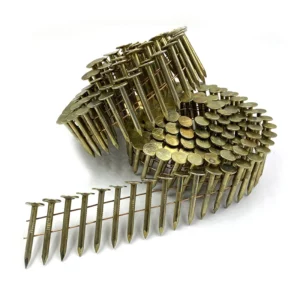Roofing projects demand reliable and efficient fastening solutions to ensure the integrity and longevity of the roof. Coil roofing nails have emerged as a popular choice among roofing professionals due to their unique features and benefits. In this article, we will delve into the world of coil roofing nails, exploring their characteristics, advantages, coil roofing nails and applications in the roofing industry.

Understanding Coil Roofing Nails:
Coil roofing nails are specially designed fasteners used for installing roofing materials, such as asphalt shingles, felt, and insulation boards. Unlike standard nails, coil roofing nails are collated in a coil configuration, allowing for rapid and continuous installation. These nails are typically made from galvanized steel or stainless steel to provide durability and protection against corrosion.
Features and Benefits:
1. Collated Coil Design: Coil roofing nails are arranged in a coiled strip, which offers several advantages. The coil configuration allows for a higher nail capacity, reducing the frequency of reloading and increasing productivity on the job site. The continuous feed of nails also minimizes interruptions, enabling roofers to work more efficiently.
2. Shank Types: Coil roofing nails are available in various shank types, including smooth shank and ring shank. Smooth shank nails are commonly used for standard roofing applications, providing secure fastening. Ring shank nails, with their textured surface, offer enhanced holding power and resistance to withdrawal, making them ideal for high-wind and storm-prone areas.
3. Point Styles: Coil roofing nails come in different point styles, such as diamond point and blunt point. Diamond point nails have a sharp tip that aids in quick penetration, while blunt point nails have a flattened tip that reduces the risk of tearing the roofing material during installation. The choice of point style depends on the specific roofing material and project requirements.
4. Galvanized or Stainless Steel: Coil roofing nails are often coated with galvanized or stainless steel for increased corrosion resistance. Galvanized nails are coated with a layer of zinc, protecting them from rust and weathering. Stainless steel nails, on the other hand, offer superior corrosion resistance and are recommended for coastal or high-moisture environments.
Applications of Coil Roofing Nails:
1. Asphalt Shingle Roofing: Coil roofing nails are commonly used for fastening asphalt shingles to the roof deck. The nails securely attach the shingles, ensuring they stay in place even during harsh weather conditions.
2. Felt and Underlayment Installation: Coil roofing nails are suitable for attaching roofing felt and underlayment materials to the roof deck. The nails create a strong bond, preventing moisture infiltration and providing an additional layer of protection.
3. Insulation Board Attachment: In roofing projects that involve insulation boards, coil roofing nails are used to secure the boards to the roof deck. This helps improve energy efficiency and thermal insulation.
4. Repairs and Replacements: Coil roofing nails are also useful for roof repairs and replacements. Whether you need to replace a damaged shingle or fix a leak, these nails offer a reliable solution for securing roofing materials.
Coil roofing nails have revolutionized the roofing industry by providing efficiency, reliability, and precision in fastening applications. Their collated coil design, shank and point variations, and corrosion-resistant coatings make them an ideal choice for roofing professionals. Whether you are installing new roofing materials or performing repairs, coil roofing nails offer the speed and durability required to ensure a secure and long-lasting roof. When selecting coil roofing nails, consider the specific requirements of your project and consult with roofing experts to choose the appropriate nail type and configuration for optimal performance.